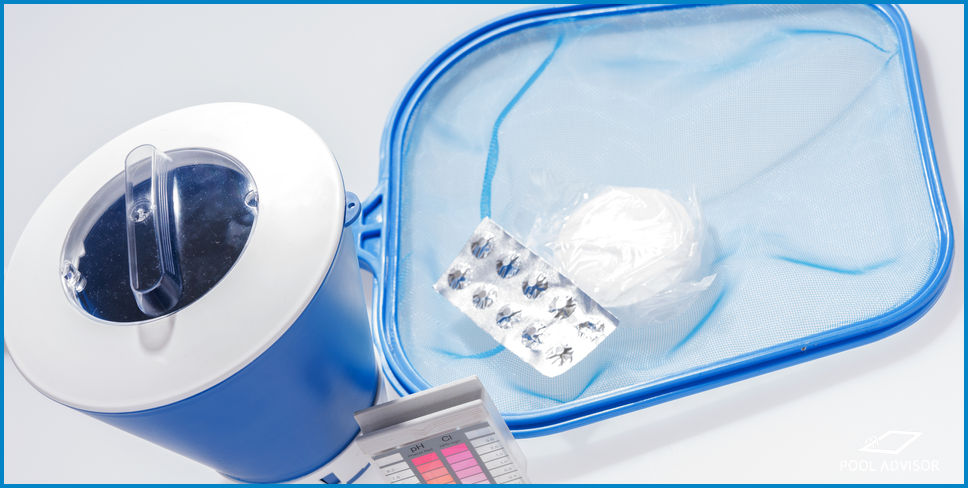
Homemade Phosphate Remover For Pools - Can You Make It Yourself?
High phosphates levels in your pool are not detrimental on their own, but left unattended they can provide food to millions of microscopic algae spores.
Some pool chemicals have convenient, at-home alternatives that can save you a trip to your pool supply store, but can phosphates be removed with at home products?
In this article we will discuss the chemicals contained in phosphate removers, products in your household that contain similar chemicals, and what the best option is to remove phosphates from your pool.
Chemicals Contained in Phosphate Removers
Phosphate removers typically contain lanthanum compounds (typically lanthanum chloride). Lanthanum is a rare earth metal that binds to the phosphates in your pool and causes them to become inactive. Other rare earth compounds that have similar properties are also used.
Lanthanum and compounds that contain it are known to be harmful at high concentrations, so great care is to be taken when using lanthanum products to treat your pool.
Household Substitutes for Phosphate Removers
Because lanthanum is considered toxic, it is not found in many household cleaning chemicals. You are more likely to find lanthanum and similar rare earth compounds inside of rechargeable batteries for electronics, such as smartphones or portable cameras.
Unfortunately there are no known homemade phosphate removers for pools, and due to the chemicals involved, it would be unsafe to try to prepare your own.
One non-chemical way to reduce phosphates in your pool is by draining off water and replacing it with fresh water from your tap. Note that this will not work if your tap water is naturally high in phosphates, and is likely to cause other issues with your pool’s chemistry.
Other Pool Chemicals That Can Remove Phosphates
It’s worth noting that aluminium sulphate, a common compound used in pool flocculants, is also mildly effective at removing phosphate from the water.
If you are having issues with high phosphate levels but are planning on using flocculant anyway for another issue, you might find that after using the flocculant, your phosphate levels have dropped somewhat.
Bear in mind that aluminium sulphate tends to work better at removing phosphate when you have clear water, which is usually not the case when you are adding flocculant!
In any case, if you are in a pinch and need to remove phosphates fast but have some leftover flocculant, it is possible that adding some of it to your pool could see a reduction in phosphates.
Recommended Phosphate Removing Products
If you have excess levels of phosphates in your pool, we recommend using products designed expressly for this purpose. These products are formulated with efficiency in mind, and are also diluted at the correct ratios to avoid dangerous amounts of toxicity.
Our favourite phosphate removers are Starver M and Starver X. Starver M is a moderate option capable of handling phosphate removal in mid-sized pools and can remove up to 2 parts per million (ppm) of phosphates in a pool of 50,000 litres.
This product does not require vacuuming and also increases the efficiency of all sanitising products in your pool, such as your salt or chlorine.
If you have an especially large pool, or extremely high phosphate levels, Starver X is the strongest phosphate remover available.
Treating very high levels of phosphates with Starver X is effective; it can remove up to 6 ppm of phosphates in a pool of 50,000 litres which greatly reduces the chances that you will have to re-treat your pool for phosphates again in the near future.
Starver X has the same great features as Starver M, making it a great option for low-fuss, bulk phosphate removal.
Once any issues with high phosphates are solved, you may want to use a phosphate-preventing product such as the Crystal Cube Floc Blocks. These cubes are added to your skimmer basket and help to actively remove phosphates from your water while also neutralising nearby algae spores.
They have flocculant as part of their formulation too, which is useful because phosphate removers can often cause cloudy water.
Conclusion
Phosphates are tricky to remove from a pool and require the use of highly specialised solutions.
Because the chemicals contained in phosphate removing products for pools are hard to find in other sources and can potentially be toxic, we recommend using products specifically designed for this purpose to keep you and your family safe.

Louis
A chemical engineer by trade, Louis is committed to debunking myths in the pool industry by explaining the underlying chemistry and making it accessible to all.
